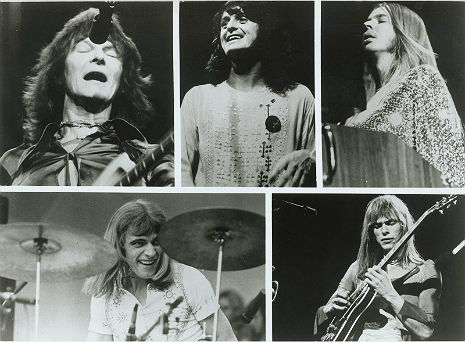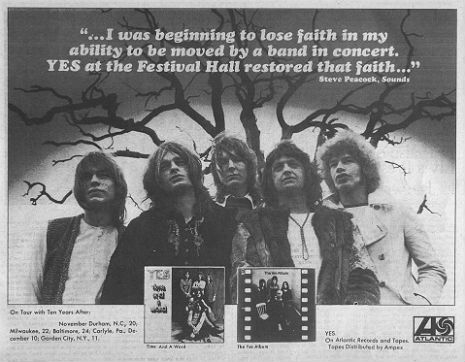
If you’re “of a certain age”—say mid-to-late-50s on up—then prog rock was most likely part of the musical background of your existence. You might not have exactly requested it specifically—was there anyone who could have anticipated, say, Jethro Tull?—but inescapably songs like “Aqualung,” Emerson Lake and Palmer’s “Lucky Man” and “Roundabout” by Yes were part of the soundtrack to your young life, even if it was just through osmosis. These days you can avoid the mainstream, back then it’s all there was and prog was the big thing for a while…
However, if you’re around my age (I’m 53) prog rock groups were seen as the enemy. Budding young rock snob that I was, I can recall picking up Uriah Heep, ELP, Robin Trower and Nektar albums at garage sales when I was in the 5th grade and being fairly perplexed that people actually liked this kind of stuff, or that I myself might be expected to like such crappy music to “fit in” or something. It was confusing when I first started buying records—an album by The Who, The Stones or The Kinks from the 60s would be great, whereas one from 1976 would be just… fucking terrible. In any case, Never Mind the Bollocks, Here’s The Sex Pistols came out two days after my 11th birthday and that confusion ended. Instantly. If you were all “punk rock,” then you had no time for prog rock bands. You hated them. They were all totally unredeemably shit. (All of them, except for maybe King Crimson. Robert Fripp, now he was cool.)
Things being the way they are, eventually the record industry, or at least a few heroic indie labels, began to sell the MOJO-reading public on the notion of opening their ears up to music they’d have shunned in the past. Admittedly, it’s only been in recent years that I’ve personally been willing to consider the prog rock genre seriously, and not be reflexively close-minded about it. I’ve simply exhausted most other sections at the record store, and I’ve got an insatiable appetite for finding new music, so why not prog? Much of what I’ve been picking up on are the surround sound editions that Porcupine Tree’s Steven Wilson has been working on, revamping classic prog albums for 5.1 audio. If Wilson is involved in it, I definitely want to hear it and as a result I’m discovering some great “new” music, like, you know… Jethro Tull.
Good times!

So yeah... um… Yes? “Roundabout” aside, I never liked Yes and never really had the time for them. I didn’t hate them—I liked “Roundabout”—but they wore capes and seemed very “Middle Earth” to me which had pretty much no appeal whatsoever when I could listen to Kraftwerk, David Bowie, The Residents or Public Image Ltd. (Ironically PiL’s Keith Levene was a roadie for Yes in 1974). When my wife admitted that she was a “closet” Yes fan I decided to bring Wilson’s Close to the Edge 5.1 surround mix home from the record store for both of us to listen to (I’m always accused of monopolizing the stereo, so this was a sop to that criticism.) I quickly got pretty obsessed with that album—ultimately annoying her with it in the process, I’m quite sure—but the thing that that just knocked down any resistance to the glory that is Yes, for me, was hearing Steven Wilson’s surround treatment of “Würm,” the third movement of The Yes Album‘s “Starship Trooper.”
Sublime. Glorious. It’s a soaring electric guitar symphony. Playing it loud—I mean really loud—as the volume rises and rises it gets to the point where you feel like you’re standing on the tarmac as a jet takes off. It’s a crazy good. Even if you hate prog rock in general—or Yes in particular—you can make an exception for this amazing song. Once you do, you’ll get why Yes was such a huge act in the 70s and beyond. It—they—suddenly clicked for me. Now I love them, or at least I love a few of their albums.

“Würm” and its memorable, hypnotic riff and blistering guitar solo, was actually taken from a song called “Nether Street” that had been recorded by Howe’s post Tomorrow and pre Yes band, Bodast, in 1968 or 69. It came to naught for them although Howe was loyal enough to the group to stick with them in the face of recruitment attempts from both Jethro Tull and Keith Emerson’s band The Nice before packing it in. Howe revived “Nether Street” for “Starship Trooper” in 1971, but it wasn’t until 1981 that the original recording saw the light of day.
Steve Howe told Music Radar:
The song wasn’t rehearsed; it was constructed in the studio from various pieces. I had the Wurm part from another band I used to be in called Bodast. It was in a song called “The Ghost Of Nether Street.” We’d recorded an album, but the label closed down, and so the record never came out.
I always loved the section as a whole piece of music, so I decided to carry it over to Yes. I like the way it goes from G to E-flat to C, but different things happen on the roots. Although it repeats endlessly, it sometimes has the fifth below roots on the chords. It sounds like a lot going on, and of course, it’s flanged.
The build-up of it is very impressive. It splits into two guitar tracks, one side taking a solo. Somehow, we did a bunch of takes, and so we’d pick the best of each. They were all done as complete takes. I remember thinking that I was sort of jamming with myself.
The “Disillusion” section came from another old song: “For Everyone” was a Yes number written by bassist Chris Squire that was played in concert back in the Peter Banks days but never recorded.

So iconic is this song, that Wayne Coyne and Steven Drozd paid tribute to the mighty “Würm” with the name of their Electric Würms project. The Würm is also a river in Bavaria which gave its name to the Würm glaciation ice age when Scandinavia and much of Britain were under ice. Wurm (sans the umlaut) is an Olde English word for “dragon.”
Here’s “Starship Trooper” as heard on The Yes Album. If you’re one of those people—like I was—resistant to prog rock, turn this sucker up good and loud and let it wash all the fuck over you. It’s over nine minutes long, but the build-up is crucial.
Here’s the original Bodast recording of “Nether Street.” Almost as amazing as “Würm” itself for—ahem—damned obvious reasons!
A fan-made video of “Starship Trooper” as it was heard on the live Yessongs album (In the concert film only the final part of the song is used, so the earlier shots are from other numbers. It works.)